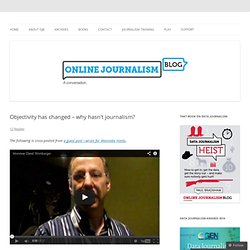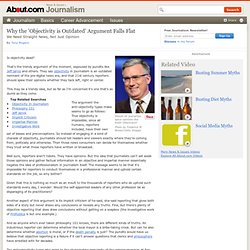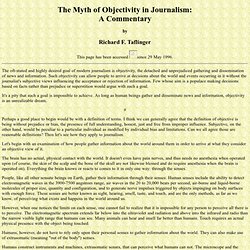

Objective Failure: Why the debate about media objectivity threatens the viability of general-interest news outlets. In the midst of a crisis threatening the very existence of the journalism industry, it might seem like an odd time to debate the merits of objective news reporting. But the doctrine of objectivity, a canon of professional journalism since the early 20th century, is at the center of the debate about the future of journalism. Some commentators claim objectivity is the source of the mainstream media’s failure to connect with the public, while others argue it is the noble ideal that will save the professional press.
Whether they deem objectivity a problem or panacea, both schools of thought subscribe to the mistaken notion that journalists must choose one of two options – embrace opinion journalism or renew the commitment to cultivating the image of objectivity. Under either scenario, general interest news sources are unlikely to survive. The conventional wisdom about today’s communications ecosystem is that we have entered an unprecedented era of partisanship. Objectivity has changed – why hasn’t journalism? The following is cross-posted from a guest post I wrote for Wannabe Hacks.

Objectivity is one of the key pillars of journalistic identity: it is one of the ways in which we identify ourselves as a profession. But for the past decade it has been subject to increasing criticism from those (and I include myself here) who suggest that sustaining the appearance of objectivity is unfeasible and unsustainable, and that transparency is a much more realistic aim. Recently I’ve been revisiting some of the research on journalistic objectivity for my inaugural lecture at City University.
But as I only mention objectivity once in that lecture, I thought it was worth fleshing out the issue further. Things change One of the reasons why I think studying journalism is so important at the moment is that the profession is rooted in a series of practices and beliefs that have specific historical roots – and things change. ”Objectivity in journalism is an illusion” Journalism, Objectivity, Objectivity in News Reporting, Fox News, MSNBC. Is objectvity dead?

That's the trendy argument of the moment, espoused by pundits like Jeff Jarvis and others. They say objectivity in journalism is an outdated remnant of the pre-digital news era, and that 21st century reporters should spew their opinions whether they tack left, right or center. This may be a trendy idea, but as far as I'm concerned it's one that's as dumb as they come. The argument the anti-objectivity types make seems to go as follows: True objectivity is impossible, since all humans, reporters included, have their own set of biases and preconceptions. So instead of engaging in a kind of charade of objectivity, journalists should tell readers and viewers exactly where they're coming from, politically and otherwise.
Well sure, reporters aren't robots. Another aspect of this argument is its implicit criticism of he-said, she-said reporting that gives both sides of a story but never draws any conclusions or reveals any truths. Objectivity, Professionalism, and Truth Seeking in Journalism : C.W. Anderson. The Myth of Objectivity in Journalism. By This page has been accessed since 29 May 1996.

The oft-stated and highly desired goal of modern journalism is objectivity, the detached and unprejudiced gathering and dissemination of news and information. Such objectivity can allow people to arrive at decisions about the world and events occurring in it without the journalist's subjective views influencing the acceptance or rejection of information. Few whose aim is a populace making decisions based on facts rather than prejudice or superstition would argue with such a goal. It's a pity that such a goal is impossible to achieve. Perhaps a good place to begin would be with a definition of terms. Let's begin with an examination of how people gather information about the world around them in order to arrive at what they consider an objective view of it. The brain has no actual, physical contact with the world. People, like all other sensate beings on Earth, gather their information through their senses. Www.uiowa.edu/~c036088/meyer.pdf.
Alex Jones: Objectivity in Journalism.